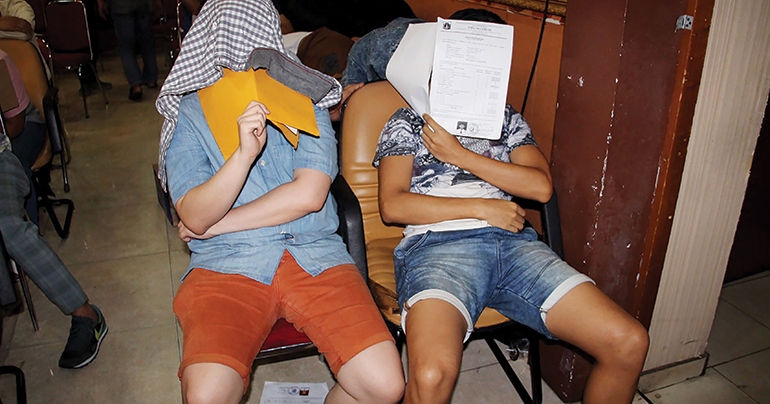As AIDS rises in Indonesia, coalition urges LGBTI vigilance
Colin Stewart is a 45-year journalism veteran living in Southern…
The pace of new HIV diagnoses is rising in Indonesia’s LGBTI population partially as a result of a growing intolerance from the country’s lawmakers and religious groups. The Indonesian AIDS Coalition has advice for at-risk people on how to stay safe.

By Lloyd Copper
Speaking to the Southeast Asia Globe just days after the world commemorated World Aids Day on Dec. 1, Aditya Wardhana has told the gay/MSM (men who have sex with men) population to:
- Be discreet on social media.
- Exercise caution before meeting people from social media and hook-up apps.
- Always inform a trusted friend before meeting in public and keep in mind that not everyone will be who they purport to be. Blackmailing to “out” someone, robbery and physical injury are all possibilities criminals can and do use.
- Be wary of holding or attending LGBT parties and gatherings.
- Be educated on local laws.

Aditya Wardhana is the executive director of the Indonesia AIDS Coalition.
He notes that the anti-pornography law Rancangan Undang-Undang Anti Pornografi dan Pornoaksi, dating from 2006, was used to justify the arrests of over 100 men in a raid on a sauna in Jakarta in 2017.
The sweeping hostility towards gay men has made HIV/AIDS outreach much more challenging, he said.
A study in the medical journal The Lancet suggested that Indonesia’s increase in HIV cases results from homophobia in addition to inadequacies in the country’s health care system. A barrier to HIV treatment and prevention is “fear of stigma among patients attending local facilities,” the article states.
While the Muslim-majority controlled area of the Aceh Banda province is undeniably hostile towards LGBT people, there is some uncertainty about the laws in other regions of Indonesia with the recent news that the city of Pariaman outlawed gay sex. Some laws that can be taken into consideration by LGBTI Indonesians are:
- Provincial Ordinance on the Eradication of Immoral Behavior (No. 13/2002) in South Sumatra: classifies and penalises same-sex relations as “immoral behavior”.
- Local Regulation [City Ordinance] Batam City No. 6/2002 about Social Ordinance, Social Order Article 9: forbids the setting up of LGBT associations (explicitly mentioned).
- Local Regulation [City Ordinance] Palembang City No. 2/2014 about the Abomination of Prostitution, Chapter V. Prohibition Provisions, Article 8: outlaws “homosexual” “prostitution”. [The publication adds, “In the city of Palembang in South Sumatra one can receive jail time and hefty fines for same-sex relations.”]
- Local Regulation [City Ordinance] about Prevention, Eradiction and Action toward Social Ills (No. 9/2010) in Padang Panjang, West Sumatra: its definition includes same-sex relationships within its scope (paid, or not paid for).
- District Ordinance on Social Order (No. 10/2007) in Banjar, South Kalimantan Province: mentions “abnormal” homosexual and
heterosexual acts (in addition to “normal” ones) in its definition of “prostitute”. No explanation is given for “normal” or “abnormal”
acts. It also prohibits the formation of organisations “…leading to immoral acts”, that are “…unacceptable to the culture of [local] society”. These are later explained by giving examples of lesbian and gay organisations “and the like”. - City Ordinance on the Development of a Value System in Social Life Based on the Teachings of Islam and Local Social Norms (No. 12/2009) in Tasikmalaya, West Java: prohibits adultery and prostitution, both heterosexual and homosexual.
Those are in addition to:
- Aceh Regulation No. 6/2014 [Provincial Ordinance] on criminal offenses under Syariah law, passed in 2014, came into effect on 23 October 2015. The law stipulates a punishment of 100 lashes and/or up to approximately eight years in prison. The regulation applies to local residents and to foreigners in the province for the crime of Liwat (male penetration) and Musahaqah (female same-sex sexual activity) in article 63 and 64.
Lloyd Copper is an Australian writer with a passion for promoting awareness of international LGBTI issues. He has a background in journalism and social work. He is a co-administrator of the Anonymous LGBT Legion page of Facebook and has previously written for Queensland Pride, an LGBTI publication, and Scenestr, an Australian arts publication.
Related articles:
- Another Indonesian city outlaws gay sex (
- Indonesian city to fine LGBT for being ‘public nuisance’ (November 2018, Jakarta Post)
- Indonesia plunges deeper into anti-gay panic (
- Indonesia puts anti-gay bill on hold (, 76crimes.com)
- Indonesia [would] criminalise homosexual and extramarital sex under proposed law changes (March 2018, South China Morning Post)
- ‘Now Indonesia Wants to Hide Its Floggings’ (July 2017, 76crimes.com)
- Indonesian Muslim leader urges boycott of pro-LGBT Starbucks (July 2017, 76crimes.com)
- Commentary: Indonesian police fuel anti-LGBT hysteria (June 2017, 76crimes.com)
- LGBT repression grows in Indonesia, with 141 arrests, public caning (May 2017, 76crimes.com)
- Study: Anti-LGBT bias costs Indonesia up to $12 billion (March 2017, 76crimes.com)
- Indonesian police push anti-LGBT militant Islamic agenda (January 2017, 76crimes.com)
- Indonesia Muslim hardliners break up what they think is gay sex party (November 2016, Reuters)
- Indonesian president: Police must defend LGBT citizens (October 2016, 76crimes.com)
- Indonesia: Detention, ‘rehab’ for 2 women who hugged (October 2015, 76crimes.com)
- Archive of this blog’s coverage of Indonesia




Commentary: Help LGBT Africans by cutting aid to anti-gay Tanzania